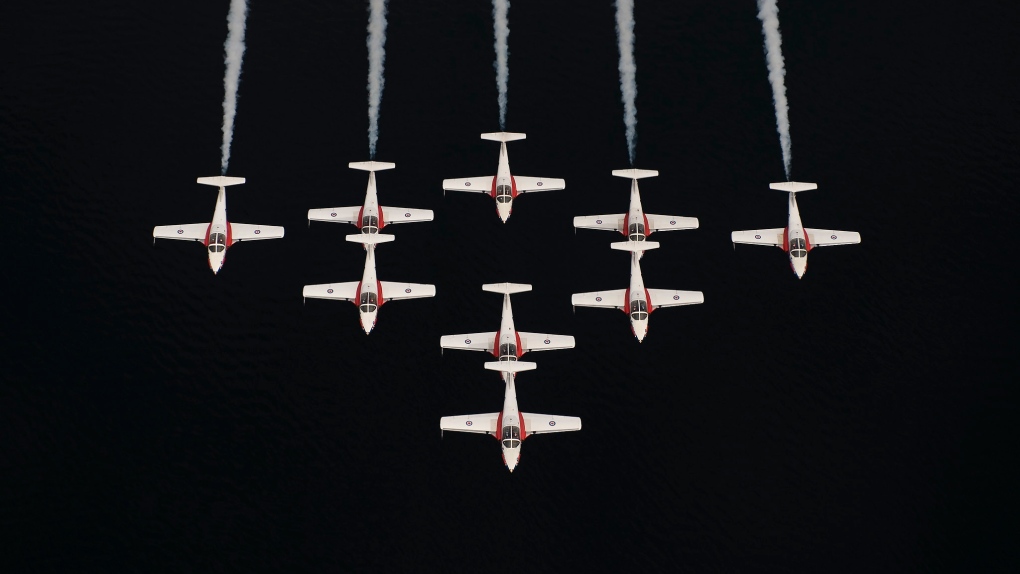Snowbirds grounded after problem discovered with emergency ejection parachute
 The Canadian Forces Snowbirds fly in Silver Dart formation over the Strait of Georgia while training at 19 Wing Comox. (Department of National Defence/Sgt Robert Bottrill)
The Canadian Forces Snowbirds fly in Silver Dart formation over the Strait of Georgia while training at 19 Wing Comox. (Department of National Defence/Sgt Robert Bottrill)
A problem with the aircraft's emergency ejection parachute has grounded the Canadian Forces Snowbirds for the foreseeable future.
The Department of National Defence said Friday the iconic aerobatic team will not fly in upcoming airshows and flybys until a problem with the timing device that releases the parachute during an emergency ejection is fixed.
The military says the issue was discovered during maintenance on parachutes aboard the CT-114 Tutor aircraft flown by the Snowbirds team.
Airplane technicians at 15 Wing Moose Jaw, in Saskatchewan, found on June 19 that the timing device may not be calibrated correctly, according to a National Defence statement.
"Out of an abundance of caution, the parachutes currently being used by aircrew flying in CT-114 Tutor aircraft will now be re-tested and re-packed, as necessary, to ensure proper timing is set for their activation in the event of an emergency," the department said.
The Royal Canadian Air Force is working with a third-party contractor to fix the problem, with no timeline for completion in sight, according to the military.
The air force expects that upcoming performances scheduled for next week in New Brunswick will be cancelled. Technicians are working to get the aging Tutor jets back in the air for Canada Day celebrations in Ottawa, according to the military.
"While it is certainly disappointing the Snowbirds anticipate they will need to cancel upcoming performances until this technical issue is resolved, I applaud our aviation technicians for discovering this issue," said 1 Canadian Air Division commander Maj.-Gen. Eric Kenny in a statement.
"We have full confidence that this issue will be resolved in a safe manner, working with a third-party aviation contractor and our own technical and maintenance experts," Kenny added.
The air force says the issue with the parachute timing device is not related to the fatal crash of the Snowbirds jet that killed public affairs officer Capt. Jenn Casey in Kamloops, B.C., in May 2020.
PRIOR PARACHUTE ISSUES
One month after the fatal Kamloops crash, a military investigation into an earlier crash was released, finding that the ejection seat of a Snowbirds aircraft became tangled with the pilot's parachute as he tried to escape his plane before hitting the ground in 2019.
The pilot sustained minor injuries and the Tutor jet was destroyed after slamming into a farmer's field while en route to an airshow in Atlanta, Ga.
Investigators determined the entanglement prevented the parachute from opening properly.
The report found the most likely cause of the parachute malfunction was the release of one or more parachute pack cones before the timing device was activated.
"Entanglement of the suspension lines with parts of the ejection seat immediately followed, ultimately disrupting the proper opening of the parachute canopy," according to a summary of the report.
"Inspection of all related Tutor aviation life support equipment was subsequently carried out to ensure fleet airworthiness."
CTVNews.ca Top Stories

W5 Investigates A 'ticking time bomb': Inside Syria's toughest prison holding accused high-ranking ISIS members
In the last of a three-part investigation, W5's Avery Haines was given rare access to a Syrian prison, where thousands of accused high-ranking ISIS members are being held.
Trudeau Liberals' two-month GST holiday bill passes the House, off to the Senate
The federal government's five-page piece of legislation to enact Prime Minister Justin Trudeau's promised two-month tax break on a range of consumer goods over the holidays passed in the House of Commons late Thursday.
Irregular sleep patterns may raise risk of heart attack and stroke, study suggests
Sleeping and waking up at different times is associated with an increased risk of heart attack and stroke, even for people who get the recommended amount of sleep, according to new research.
California man who went missing for 25 years found after sister sees his picture in the news
It’s a Thanksgiving miracle for one California family after a man who went missing in 1999 was found 25 years later when his sister saw a photo of him in an online article, authorities said.
As Australia bans social media for children, Quebec is paying close attention
As Australia moves to ban social media for children under 16, Quebec is debating whether to follow suit.
Notre Dame Cathedral: Sneak peak ahead of the reopening
After more than five years of frenetic reconstruction work, Notre Dame Cathedral showed its new self to the world Friday, with rebuilt soaring ceilings and creamy good-as-new stonework erasing somber memories of its devastating fire in 2019.
Canada Post temporarily laying off striking workers, union says
The union representing Canada Post workers says the Crown corporation has been laying off striking employees as the labour action by more than 55,000 workers approaches the two-week mark.
Can't resist Black Friday weekend deals? How to shop while staying within your budget
A budgeting expert says there are a number of ways shoppers can avoid getting enveloped by the sales frenzy and resist spending beyond their means.
Montreal shopping mall playing 'Baby Shark' song to prevent unhoused from loitering
A shopping mall and office complex in downtown Montreal is being criticized for using the popular children's song 'Baby Shark' to discourage unhoused people from loitering in its emergency exit stairwells.


































